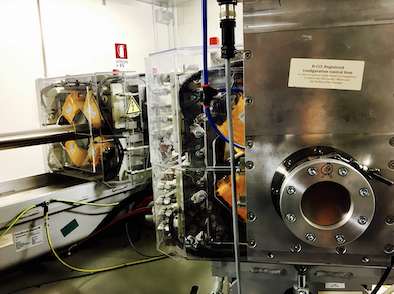Speaker
Description
PURPOSE
To present the GR5 project titled “XpCalib – Proton therapy X-ray CT calibration by proton tomography” recently financed by INFN.
BACKGROUND
In recent past, INFN research projects such as Prima, RDH and IRPT have studied the feasibility of proton Computed Tomography (pCT) as a tool to improve treatment accuracy in hadron therapy.
In this framework a pre-clinical prototype has been successfully built and tested under 210 MeV proton beam at the APSS Proton Therapy Centre in Trento.
Good quality proton tomographies of certified and anthropomorphous phantoms have been reconstructed using this apparatus. Our pCT system allowed directly measuring relative stopping power (RSP) 3D maps with an accuracy of about 1%, thus demonstrating the potential of this technique with respect to state-of-art methodologies based on the conversion of Hounsfield units (HU) from x-CT.
RATIONALE
Different x-CT calibration methods were investigated and applied to provide accurate RSP maps for patient treatment planning in proton therapy. Conventionally, single-energy x-CT calibration is obtained by scanning a number of tissue equivalent materials, which however have limitations in mimicking the radiological properties of real tissues, due to the degeneration of the relationship between relative electron density and CT numbers. To overcome this issue, a stoichiometric calibration has been introduced and, more recently, dual-energy x-CT methods have been investigated.
It is common practice in proton therapy to assume an uncertainty of about 3% in the estimated particle range, and to compensate for that in the planning phase, thus leading to an increased volume of healthy tissue being irradiated. By decreasing the uncertainty on the proton estimated range, a significant reduction of the irradiated healthy tissues surrounding the tumor with increased treatment conformity could be obtained.
OBJECTIVES
In this project the INFN pCT system will be used to extend its potential towards clinic applications in the field of proton therapy, to decrease the uncertainty on the proton estimated range.
In particular, by applying the pCT on biological test phantoms, we aim at improving the accuracy of the x-CT calibration in producing the RSP maps for proton therapy treatment planning to finally outperform most advanced dual energy x-CT techniques.
DESIGN OF THE STUDY
The x-CT system already in use for patient treatment planning in the Proton Therapy Centre of Trento APSS will be cross calibrated by means of the INFN pCT apparatus. The latter will be implemented in the experimental beam line room of the APSS centre. For cross-calibration, a set of dedicated biological phantoms will be designed and prepared.
RSP values of the biological phantoms directly measured by the pCT apparatus will be compared with the Hus obtained by x-CT measurements of the same phantoms in order to obtain a calibration map of this system.

